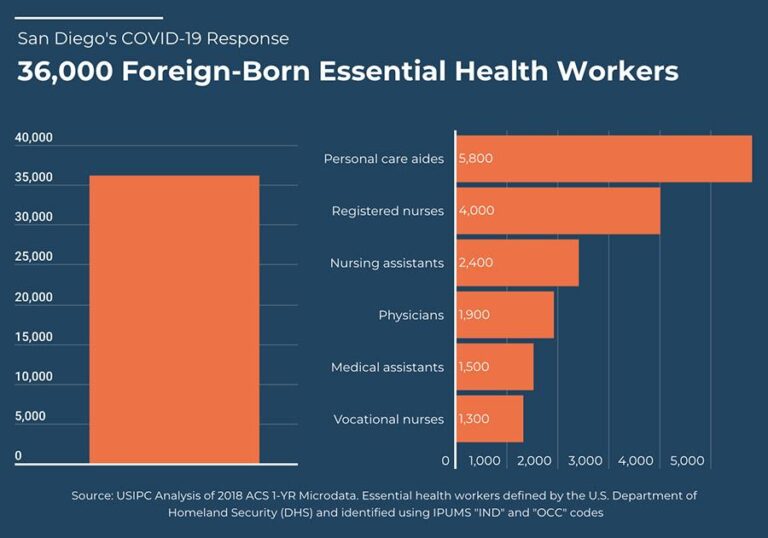A new report from UC San Diego highlights the vital role immigrants play in the workforce of San Diego, revealing that one-third of the city’s essential workers are immigrants. As the region continues to navigate the challenges posed by the COVID-19 pandemic and economic recovery, this data underscores the significant contributions of immigrant communities in sectors critical to public health, safety, and daily life. The findings shed light on the diverse makeup of essential labor in San Diego and raise important considerations for policymakers and community leaders.
Immigrant Contributions Shape San Diego’s Workforce Landscape
Immigrants play a pivotal role in maintaining the resilience and diversity of San Diego’s workforce, particularly in essential sectors such as healthcare, agriculture, and public services. According to recent UC San Diego data, these workers not only fill critical roles but also contribute to the region’s economic vitality and social fabric. Their efforts underpin everyday operations, from ensuring food security to delivering medical care, often under challenging conditions.
The report highlights several key contributions that immigrant workers bring to the region:
- Healthcare: Providing frontline support in hospitals and clinics, making up a significant portion of nursing and support staff.
- Agriculture and Food Production: Sustaining the local food supply chain through labor-intensive roles in planting, harvesting, and processing.
- Public Services: Staffing essential public safety and sanitation positions, ensuring community well-being.
| Sector | Percentage of Immigrant Workforce | Impact |
|---|---|---|
| Healthcare | 40% | Frontline patient care and support |
| Agriculture | 35% | Food production and supply stability |
| Public Services | 30% | Essential infrastructure maintenance |
Challenges Faced by Immigrant Essential Workers Amid the Pandemic
Immigrant essential workers in San Diego have been disproportionately affected during the COVID-19 pandemic, encountering a complex array of obstacles in both their professional and personal lives. Many faced limited access to healthcare and testing despite maintaining frontline roles that put them at high risk of exposure. Fear of job loss or deportation often prevented workers from advocating for improved workplace safety or taking sick leave, further exacerbating their vulnerability. Language barriers and limited digital literacy compounded challenges in understanding rapidly changing public health guidelines.
Compounding these difficulties, immigrant workers frequently navigated systemic inequities such as:
- Poor access to personal protective equipment (PPE) in essential sectors like food service and healthcare support
- Lower average wages and lack of paid sick leave compared to native-born counterparts
- Overcrowded living conditions, increasing transmission risk within households
| Factor | Impact on Immigrant Workers |
|---|---|
| Healthcare Access | Limited insurance and fear of using public services |
| Job Security | High anxiety over potential layoffs or retaliation |
| Communication | Insufficient multilingual resources and outreach |
Economic and Social Impact of Immigrant Labor in Key Sectors
Policy Recommendations to Support and Protect Immigrant Essential Workers
To create a safer and more equitable environment for immigrant essential workers in San Diego, it is crucial to implement robust policies that address both workplace safety and economic security. Priority actions include enhancing access to healthcare regardless of immigration status, mandating employer-provided personal protective equipment (PPE), and ensuring comprehensive paid sick leave. These measures not only protect workers but also help prevent the spread of illness within communities, fostering stronger public health outcomes citywide.
Furthermore, support systems must be fortified to alleviate financial vulnerabilities and legal uncertainties for immigrant workers. Key recommendations ask for:
- Work authorization reforms that simplify the process and reduce exploitation risks.
- Targeted wage protections to combat underpayment and wage theft prevalent among immigrant-heavy industries.
- Community outreach programs providing multilingual resources and legal assistance.
| Policy Area | Proposed Action | Expected Outcome |
|---|---|---|
| Healthcare Access | Expand coverage regardless of immigration status | Improved worker health and reduced community spread |
| Workplace Safety | Mandate employer-provided PPE and training | Decreased workplace transmission of illnesses |
| Legal Protections | Facilitate easier work authorization | Lower exploitation, increased economic stability |
In Summary
As this report from UC San Diego Today highlights, immigrants make up a vital segment of San Diego’s essential workforce, underscoring their indispensable role in the region’s economy and community resilience. Recognizing and supporting these workers remains a critical priority for policymakers and the public alike, as San Diego continues to navigate the challenges of a post-pandemic recovery. Continued attention to the contributions and needs of immigrant essential workers will be key to building a more inclusive and sustainable future for the city.




